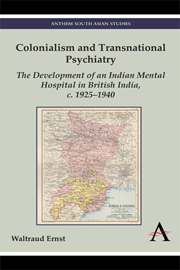 Colonialism and Transnational Psychiatry
Colonialism and Transnational Psychiatry Book contents
- Frontmatter
- Contents
- Acknowledgements
- Abbreviations
- Tables and Figures
- Introduction
- Chapter 1 Indianisation and its Discontents
- Chapter 2 The Patients: The Demographics of Gender and Age, Locality, Occupation, Caste and Religion
- Chapter 3 Institutional Trends and Standardisation: Deaths, Diseases and Cures
- Chapter 4 Classifications, Types of Disorder and Aetiology
- Chapter 5 Treatments
- Conclusion
- Notes
- Bibliography
- Index
- Frontmatter
- Contents
- Acknowledgements
- Abbreviations
- Tables and Figures
- Introduction
- Chapter 1 Indianisation and its Discontents
- Chapter 2 The Patients: The Demographics of Gender and Age, Locality, Occupation, Caste and Religion
- Chapter 3 Institutional Trends and Standardisation: Deaths, Diseases and Cures
- Chapter 4 Classifications, Types of Disorder and Aetiology
- Chapter 5 Treatments
- Conclusion
- Notes
- Bibliography
- Index
Summary
This book focuses on the Ranchi Indian Mental Hospital, the largest public psychiatric facility in colonial India during the 1920s and 1930s. Although it does not cover the views of the patients and their families, its scope is wide-ranging in other respects and it breaks new ground in the fields of history of colonial medicine in South Asia and of the history of psychiatry more broadly. The latter has been a mixed blessing on account of the relative dearth of material that would have allowed a comparison of trends at Ranchi to those in other institutions in India and Britain. Historians of Indian colonial medicine as well as of psychiatry have hitherto tended to focus on earlier periods. Only very recently have they begun to investigate institutions during the early twentieth century. To date, the few existing studies on particular mental hospitals in Britain do not consistently and comprehensively deal with the full range of institutional data here examined. In particular, information on the types of mental disorders assigned, variations in classifications and conceptual changes are rarely discussed. Nor do they frame local developments in relation to global and transnational ones. It will be left to subsequent scholarship to assess how the local affairs and transnational connections discussed in the current study on Ranchi compare with a wider range of institutions in, and medical exchanges between, South Asia, Western countries and other parts of the world.
Five themes drive the analysis of the Ranchi material.
- Type
- Chapter
- Information
- Colonialism and Transnational PsychiatryThe Development of an Indian Mental Hospital in British India, c. 1925-1940, pp. xvii - xxPublisher: Anthem PressPrint publication year: 2013


